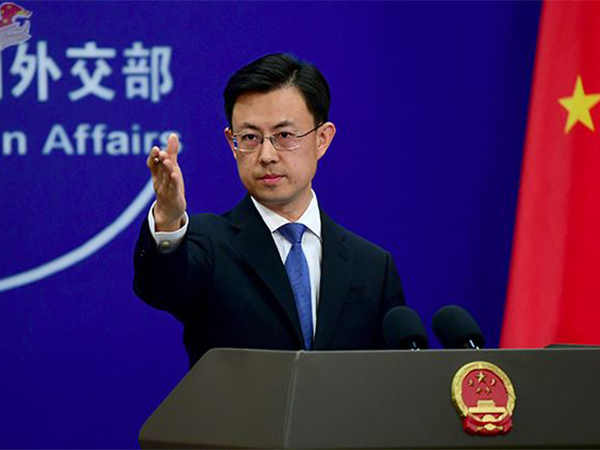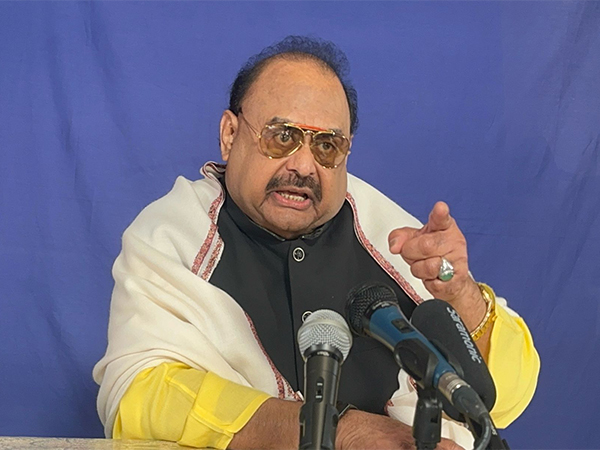Pakistan's con games: Wooing allies, targeting critics
Sep 11, 2021

Islamabad [Pakistan], September 11 : Worried over the possibility of sanctions being imposed on it for nurturing, funding and supporting terror groups in its neighbouring countries, Pakistan has launched a diplomatic offensive, simultaneously wooing allies and targeting critics, according to expert.
C Christine Fair, writing in Foreign Policy said that American leaders need to stop falling for this line--and start making sure Islamabad pays a price for its reckless actions and the cost in Afghan, Indian, and Pakistani lives.
Pakistan is an arsonist that wants you to think it's a firefighter. They paint themselves as the solution to the very problems it created.
Pakistani officials contend that they were a victim of American perfidy when the latter forgot Pakistan existed in the 1990s, leaving Islamabad to contend with the mess.
Pakistan's interests in Afghanistan have deep roots. Pakistan, seeking to influence its obstinate western neighbour, began supporting the growth of the reformist Islamist organization Jamaat-e-Islami in Afghanistan, where it originally had little support. This development was propitious. The majority of the so-called mujahideen groups that would eventually be mobilized by Pakistan were rooted in Jamaat-e-Islami, reported Foreign Policy.
Moreover, the Pakistani notorious intelligence - ISI nurtured, created, and supported the Taliban in their first incarnation; it returned to doing the same after the Taliban regime's fall in late 2001. Pakistan has deployed its spin doctors to claim otherwise--using the same old strategy.
Pakistan opines that it is the real victim of terrorism, that it is being unjustly maligned, and that if the West wants to fight terrorism, it needs to give Pakistan more money--and ignore its wrongdoings, which include sponsoring numerous Islamist terrorist groups as well as vertical and horizontal nuclear proliferation, says Fair.
Ordinary Pakistanis are, indeed, the victims of terrorist monsters--monsters bred and trained by the military-intelligence establishment.
Washington has an endless appetite for Islamabad's con games. Pakistan's ability to convince Americans of its signal importance might seem baffling--but it represents a sophisticated and strategic diplomatic approach, says Fair.
First and foremost, Pakistan exploits information asymmetries. As Teresita and Howard Schaffer wrote in 2011, the United States is one of the most important portfolios for diplomatic, political, and military officials. They are required to know their briefs and recite them convincingly.
Islamabad understands the value of congressional delegations in shaping policymakers' opinions. Unlike protocol-bound India, Pakistan dispenses with all diplomatic protocol on these occasions. Delegates meet the army chief, the ISI chief, and the prime minister, and they are often treated to military tourism opportunities, says Fair.
Pakistan also has a history of cultivating shadowy figures who launder Islamabad's dirty laundry and promote its pet projects to American policymakers and opinion-makers.
It discourages criticism by denying visas, restricting access, or outright threatening violence to those who dare expose the dark side of Pakistan's deep state, reported Foreign Policy.
With the US Embassy in Kabul shuttered, the United States is very likely to do what it usually does: go back to the arsonist and sustain the pretence that it is in fact the fire brigade, says Fair.
Pakistan will continue to provide the minimal results to justify the expenditures to a US Congress that is always wary of Pakistan but not enough to do anything meaningful to curtail its myriad outrages.
In the meantime, Pakistan's militant assets cultivated for action in India will benefit enormously from the terrorist safe havens protected by the Taliban-led house of horrors that is the Afghan government, says Fair.
The United States must exorcise the fear that Pakistan is too dangerous to fail. Right now, Washington and its partners must focus on ameliorating the humanitarian disaster that the United States and Pakistan created, says Fair.
The international community must demand that Pakistan provide a safe corridor for those Afghans who do not want to live shackled to the horrors of the Taliban regime.
It must provide safe passage even to those Afghans who worked in the legitimate government and who may be viewed as enemies of Pakistan and its Taliban lieges, says Fair.
At the same time, the United States must take steps to punish Pakistan for its ongoing military and other support to the Taliban, the Haqqani network, and other Islamist militants it uses at home and abroad, says Fair.
Meanwhile, the Taliban announced their interim cabinet, which includes declared terrorist Sirajuddin Haqqani, head of a brutal eponymous terrorist network, as the new acting interior minister, as well as numerous others who are on various American and UN sanctions lists.
Critically, the United States should employ sanctions under the Treasury Department for any Pakistani official for whom there is credible intelligence indicating they have supported the archipelago of terrorist training facilities in Pakistan and Afghanistan.
The United States should also declare Pakistan a state sponsor of terrorism--with clearly defined benchmarks according to which this status can be reversed, reported Foreign Policy.
It should at least allow Pakistan to receive the blacklisting it so deserves when it is next evaluated by the Financial Action Task Force, the global body that evaluates corruption, money laundering, and terrorist funding in national financial systems, says Fair.

















